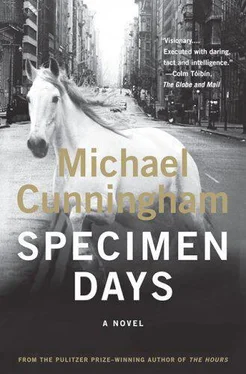Michael Cunningham - Specimen Days
Здесь есть возможность читать онлайн «Michael Cunningham - Specimen Days» — ознакомительный отрывок электронной книги совершенно бесплатно, а после прочтения отрывка купить полную версию. В некоторых случаях можно слушать аудио, скачать через торрент в формате fb2 и присутствует краткое содержание. Город: New York, Год выпуска: 2005, ISBN: 2005, Издательство: Farrar, Straus and Giroux, Жанр: Современная проза, на английском языке. Описание произведения, (предисловие) а так же отзывы посетителей доступны на портале библиотеки ЛибКат.
- Название:Specimen Days
- Автор:
- Издательство:Farrar, Straus and Giroux
- Жанр:
- Год:2005
- Город:New York
- ISBN:0-374-70515-1
- Рейтинг книги:4 / 5. Голосов: 1
-
Избранное:Добавить в избранное
- Отзывы:
-
Ваша оценка:
- 80
- 1
- 2
- 3
- 4
- 5
Specimen Days: краткое содержание, описание и аннотация
Предлагаем к чтению аннотацию, описание, краткое содержание или предисловие (зависит от того, что написал сам автор книги «Specimen Days»). Если вы не нашли необходимую информацию о книге — напишите в комментариях, мы постараемся отыскать её.
Specimen Days — читать онлайн ознакомительный отрывок
Ниже представлен текст книги, разбитый по страницам. Система сохранения места последней прочитанной страницы, позволяет с удобством читать онлайн бесплатно книгу «Specimen Days», без необходимости каждый раз заново искать на чём Вы остановились. Поставьте закладку, и сможете в любой момент перейти на страницу, на которой закончили чтение.
Интервал:
Закладка:
“Okay,” she said to the boy. “I’m ready now, too.”
There was nothing to give him for breakfast. She’d get him something en route to the train station.
The train was the best way. She didn’t have a car, and if she rented one it’d be traceable. Plane tickets would leave a record, too. You could pay cash for train tickets, and no one needed to know your name or anything about you at all.
She took him downstairs, paused with him on the stoop, looking up and down the block. It was the regular early-morning scenario. The achievers on their way to work, the shoe-repair guy rolling up his grate. The old man raved in front of the flower shop across the street. It was another day on East Fifth.
She hesitated. This was her last chance to do the right and rational thing. She could take the kid in. She’d lose her job, of course not policy to drug a dangerous suspect and keep him in your apartment overnight. But she could get another job. She could get another boyfriend. She could hand over the kid and go on as a respectable citizen. What she was doing what she had not yet done but was about to do would be irreversible.
The little boy took her hand. “Is something wrong?” he asked.
“No,” she said. “Nothing’s wrong.”
With a sense of vertiginous recklessness, a queasy and light-headed plunging, she led the child down into the street.
She stopped at an ATM and withdrew five hundred from her checking, five hundred from her savings. That was the maximum. Money would be a problem, of course. If she used her credit cards or withdrew more money from another ATM tomorrow, they’d be able to trace her. She’d figure something out. She’d have to.
She took the kid to a Korean market, bought two big bags full of food, and paid with her Visa card it wouldn’t make any difference, charging this last purchase in New York. The food would last them for a couple of days. She got the kid an egg on a bagel and got one for herself. He ate his bagel cautiously, in tiny bites, in the cab on the way to Penn Station.
“How long does it take to get to the beach?” he asked.
Right. The beach. They should head south, shouldn’t they? Better to be scraping by in a warm climate.
She said, “It’ll take a while. The beach is pretty far away.”
He nodded, chewing. “This is good,” he said.
They got to Penn Station. She bought them two tickets on a train leaving for Washington, D.C., in twenty-five minutes. They’d change trains in Washington. They’d change trains a couple of times.
Penn Station was mostly businesspeople, this early. It was the minor movers and shakers (the big ones flew) off to Boston or Washington, doing deals, standing now in the bright nowhere of the station, sipping Starbucks, talking on cell phones, guarding their briefcases against thieves, heads full of flowcharts and cost analyses; men in decent if unspectacular suits, women with impeccable hair and heavy makeup, working their pieces of it, lining up lunches, phoning in last-minute questions to bosses or instructions to spouses, maintaining their accounts, soliciting new business, keeping it going, moving it along.
And here she was, holding the hand of an impaired child, with two sacks of groceries, a pipe bomb, and a copy of Leaves of Grass. The others made a little extra room for her, unconsciously, the way New Yorkers do when they sense the presence of someone strange. Black woman with a compromised white child. Crazy. Or so luckless, so dispossessed, as to be crazy by default. Here, then, was the beginning of her strange new life.
Every atom belonging to me as good belongs to you.
Their train was announced, and they got on. She found two seats, gave the kid the window. As the train pulled out, he pressed his moon face to the glass.
“Here we go,” he said. “Yes. Here we go.”
She was terrified and elated. She couldn’t be too optimistic about their prospects it was hard to vanish, and she was already down to eight hundred and seventy-some dollars, after paying for the cab and the train tickets. Most likely she was only delaying the inevitable, and it would not go well for her if they were caught. She’d do time. Pete would intervene on her behalf. That would help. A lawyer would argue that she’d lost her own child and had collapsed under the stress of her job. Maybe they’d go easy on her. Maybe not.
And maybe, just maybe, she and the kid would get away. It happened. People disappeared. Maybe, just maybe, she’d be able to get a job waitressing or tending bar in Sarasota or Galveston or Santa Rosa. She’d keep them out of the cities. Maybe she’d be able to rent them a little apartment close to a beach, get a simple job, give the kid books to read, get him a dog. They’d probably have to keep moving. People would get curious. People would want to know why the kid wasn’t in school, and telling them that he wasn’t right, that she educated him at home, would hold up for only so long. But if they kept moving, if they lived in enough places, then maybe they could manage to eradicate their pasts, become just another woman with a child, trying to survive in the big, difficult world. There were so many people out there living anonymously. It was possible, it was not impossible, that they could join them.
The train pulled out of the long darkness of the tunnel into the marshland of New Jersey. The boy gasped at the sight, though it was only cattails and scummy little pools of dark green water.
“You like it?” she asked. “Uh-huh.”
“You know what we need to do? We need to give you a name.”
“I like Smokey. I do.”
“Smokey’s not a good name for a boy.”
“Luke?”
“Oh, I don’t think so.”
“I know your other boy has that name. But I could have it, too, don’t you think?”
“I don’t know. I think you should have a name all your own.”
“I like Luke.”
He returned to the window, enraptured. Although the field of cattails was interrupted periodically by asphalt tundras full of empty delivery trucks, and was studded with utility poles and smokestacks, Cat had to admit that there was something… wild about it, if not exactly beautiful. Even here, this close to the city, were brief passages of land that had probably looked just this way before the first tree was felled to build the first farmhouse. It was a brilliant morning, building toward a hot, cloudless afternoon. Early sun gilded the marsh, glittered on the brackish water.
They were going, then. They were on their way someplace; there was no telling what would happen to them. It was morning everywhere. It was morning in Dayton and Denver and Seattle. It was morning on the beaches and in the forests, where the nocturnal hunters had returned to their dens and the timorous daylight animals, the ones meant to be eaten, were out browsing for food. It was morning on the tin roofs of factories and on the mountain peaks, morning in the fields and parking lots, morning in the rented rooms where women with no money did what they could to keep their children alive and healthy where they hoped, given what they had to work with, to make them happy, at least some of the time.
A seagull, almost painfully white, dipped down and for a moment kept abreast of the train. Cat could see the black bead of its eye, the spot of brilliant orange on the underside of its beak.
She took a quick look inside her bag. Yes, the bomb was still there. Her cell was blinking. Someone had left a message. She clicked the phone off.
The boy turned back from the window. His face was bright with excitement.
He said, “You know what?”
“What?”
“The smallest sprout shows that there’s really no death.”
“Right.”
He turned back to the window, watched rapturously as the train rumbled into New Jersey. He was harmless now. He’d been disarmed. He was just a little boy, happy for the first time in his life. She could get to him, couldn’t she? She could bring him around. It was what she’d been trained to do.
Читать дальшеИнтервал:
Закладка:
Похожие книги на «Specimen Days»
Представляем Вашему вниманию похожие книги на «Specimen Days» списком для выбора. Мы отобрали схожую по названию и смыслу литературу в надежде предоставить читателям больше вариантов отыскать новые, интересные, ещё непрочитанные произведения.
Обсуждение, отзывы о книге «Specimen Days» и просто собственные мнения читателей. Оставьте ваши комментарии, напишите, что Вы думаете о произведении, его смысле или главных героях. Укажите что конкретно понравилось, а что нет, и почему Вы так считаете.












